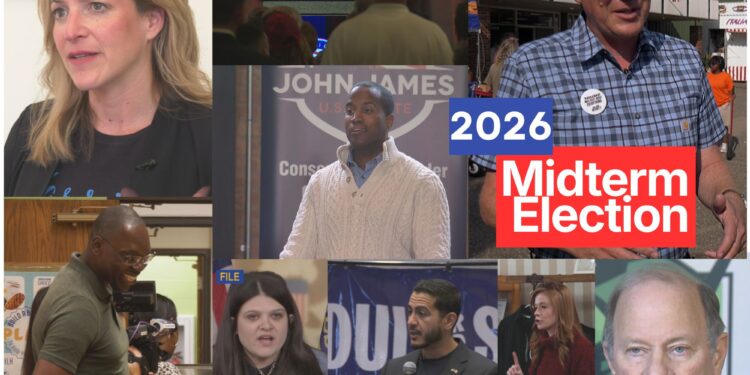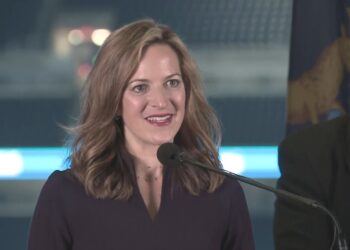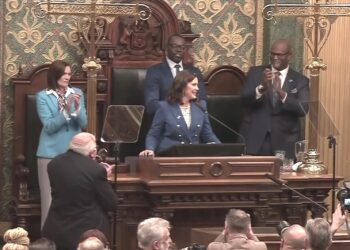LANSING, Mich. (WZMQ) – Michigan voters will face an unusually crowded ballot in 2026, with top-tier statewide offices, the governor’s seat, an open U.S. Senate seat, attorney general, secretary of state, and dozens of legislative races all in play.
Political experts say this creates a rare “fresh look for both parties, a chance for them to press the reset button… or continue on past successes,” according to Corwin Smidt, interim director of Michigan State University’s Institute for Public Policy and Social Research.
Governor’s Race
The turnover begins at the top: Gov. Gretchen Whitmer is term-limited, setting off a scramble among Republicans, Democrats, and even an independent with the former mayor of Detroit, to define the state’s political direction.
Current Secretary of State Jocelyn Benson, Lieutenant Governor Garlin Gilchrist, former Genesee County Sheriff Chris Swanson, and a Michigan native and former Mayor of Cape Coral, Florida, Marni Sawicki, are all running for the Democratic Nomination.
On the republican ticket, there are a lot of new names in Michgian politics. Anthony Hudson, William Null, Ralph Rebandt, and Karla Wagner are all new names with hats in the ring. In addition, Former Attorney General Mike Cox, Former U.S. Rep. John James, Former House Speaker Rep.Tom Leonard, and Senate Minority Leader Aric Nesbitt. James is leaving what Smidt calls “a pretty swing district that could go either way” to run for governor, a shift he says will reshape both state and federal political maps.
Smidt says the packed gubernatorial field reflects more than just political ambition. “Some of this is who’s interested in becoming the figurehead and talking point for their party,” he said. “They may not necessarily see this as a chance to win the office as much as a chance to insert themselves into the state debate and get a higher profile.”
U.S. Senate
With Senator Gary Peters announcing his retirement, the U.S. Senate race, open for the first time in decades, is also drawing intense national focus. Smidt said national Democrats from “DC and New York are way more interested in the Michigan Senate Democratic primary than Democratic voters in Michigan,” as progressive, moderate, and institution-aligned factions line up behind Abdul El-Sayed, Senator Mallory McMorrow, and U.S. Rep. Haley Stevens. There is a fourth candidate in the race, Rachel Howard, a veteran and health researcher.
On the Republican side, he says it’s “less clear how much Donald Trump’s endorsements are going to carry weight” in 2026. The party has a seemingly clear frontrunner in Mike Rogers, the former U.S. Representative who ran against Elissa Slotkin last year. Four others have declared their candidacy for the seat as well: DUndee Dentist Kent Benham, Engineer Fred Heurtebise, Genevieve Scott, and former co-chair of the Michgian GOP Bernadette Smith.
Michigan’s State Legislature
Legislative races will be equally unpredictable. Michigan’s revised term-limit system, combined with retirements and lawmakers switching chambers, has created uncertainty in both the House and Senate. Smidt said the wave of movement, including state lawmakers pursuing county or city roles could “open the door for one party more than the other.”
The Upper Peninsula will see significant reshuffling during the process. Senator Ed McBroom (R- Wahcedah Township) is term-limited, and Representative Dave Prestin(R-Cedar River) is running to replace him, leaving his seat representing the 108th State House District open. Former State Rep. Beau LaFave has also entered the race for the 38th State Senate District. Smidt says the move likely comes down to influence: “Senate, you just get more hands-on things… You get more connections.”
Democrats, meanwhile, will again attempt to retake the Marquette House seat, a longtime regional blue hub. Current Representative for the 109th District, Karl Bohnak, won his seat campaigning on issues related to unpopular energy laws. While legislation has been introduced to repeal the laws and change the language, the bills are sitting unmoved in the Senate. With two Democrats already announcing their campaigns, Dana LaLonde and Anna Aho Rink have a chance ar reigniting the peninsula’s blue hub.
Down-ballot offices also bring notable stakes. Attorney general, secretary of state, and statewide judicial candidates are selected at party conventions, decisions that Smidt says could define how each party is perceived. He noted that Republicans were “seen as taking a negative step” with their 2022 nominees, a move that may have damaged the ticket.
Beyond candidate matchups, policy issues and ballot initiatives could shift turnout in either direction. Rural hospital funding, environmental issues, and possible proposals, including property tax reforms or ranked-choice voting, may loom large. Smidt said some of these debates could become “key linchpins,” especially as lawmakers navigate changing federal funding and court decisions that may affect state tax structures.










